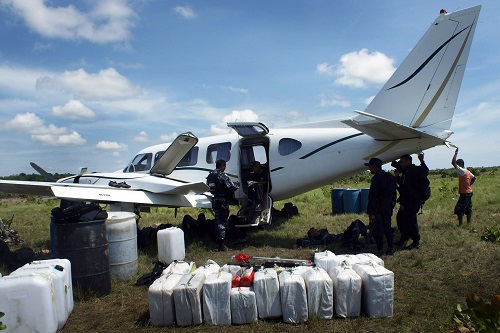Reuters photo
By
Ricardo Swire
Paraguay is a centrally situated South American farming nation of 6.73 million residents, approximately the size of California. The Republic is landlocked between Bolivia, Argentina and Brazil. Following Brazil, Chile, Colombia, Honduras, Peru, Uruguay and Venezuela, Paraguay is the ninth South and Central American country to adopt special legislation permitting internal security forces to shoot down unauthorised or unresponsive aircraft traversing territorial airspace. Internal security intelligence reports noted the government’s National Civil Aviation Directorate’s (DINAC) substandard regulations impede Paraguay’s aerial drug smuggling counteroffensives.
The US Drug Enforcement Administration (DEA) estimated aerial trafficking accounts for twenty percent of South and Latin America’s smuggled narcotics. Paraguay’s Air Force radar images and data are usually combined with Guarani International Airport radar’s 420 mile span scans. Interdiction patterns have indicated transnational criminal cartels’ small plane preference makes Paraguay the centre of regional attraction. For two decades a Paraguayan crime lord, masquerading as a car tyre magnate, supplied a powerful Brazilian gang or the First Capital Command. In June 2016 the Paraguayan kingpin was killed by First Capital Command assassins, in an attempt to control Paraguay’s drug market.
Horacio Cartes, the country’s 2013 elected president is a rich tobacco magnate who owns more than twenty companies that include a soft drinks bottler, financial institutions, a sports team and chain of soybean farms. In 2000 Paraguayan National Anti-Drug Secretariat (SENAD) agents confiscated a drug plane loaded with marijuana and cocaine on one of the president’s farms. Two years later Paraguayan Police Investigations Department (DIPC) detectives detained the senior politician on currency fraud and tax evasion charges.
The Paraguayan president has been probed by DEA agents for drug trafficking associations. One of his Cook Islands registered banks, suspected of money laundering, had no employees or physical building. On August 22, 2017 neighbouring Bolivian counter-narcotics law enforcers seized five tons of marijuana in the possession of three detained Paraguayans. The shipment was en route to Argentina, Brazil and Chile. Aerial trafficking does not only fuel Paraguay’s underground drug empire. Electronic products and computers are smuggled to Brazil to avoid paying local taxes. Brazilian coffee and soy transported to Paraguay to capitalize on US currency exchange rates.
On May 31, 2017 a senior Paraguayan anti-drug prosecutor labelled the airport in Pedro Juan Caballero city Amambay province, near the Brazilian border, an “epicenter” for domestic organized crime. Pedro Juan Caballero’s border is mostly an unpatrolled 450 mile strip. The town’s 120,000 Paraguayans speak Portuguese, national language of neighbor Brazil. Paraguay depends on radar intelligence provided by Brazil and Argentina. Local airport officials blame antiquated technology for shortcomings in efforts to defeat Paraguay’s aerial drug trafficking.
A Police Investigations Department Captain offered that Pedro Juan Caballero’s classy neighborhood “Asuncion” was once selected as the ambush location of a former General in charge of the National Anti-Drug Secretariat (SENAD). The General’s driver was killed by the unidentified attackers’ gunfire. The wounded retired military department head quickly rushed to hospital in another SENAD vehicle. The General’s assassination was completed by a SENAD subordinate who sat in the backseat of the transport. Midway in the hospital journey the rogue law enforcer upholstered his service pistol and shot the General in the back of his head killing him.
On Thursday November 30, 2017 Argentina’s Agencia Federal de Inteligencia or Federal Intelligence Agency (AFI) updated data on a recent “mega operation.” The collaboration, between America’s Drug Enforcement Administration and Paraguayan SENAD operatives, dismantled the Bareiro Vargas brothers’ aerial drug trafficking network between Argentina, Paraguay, Chile and Uruguay. The brothers used a secret tarmac, in Paraguay’s southeast department of Itapúa near Argentina’s border, to fly cocaine and marijuana twice daily to other South American countries. AFI surveillance data showed a minimum five flights weekly. Paraguayan and US DEA law enforcers confiscated US$500,000 cash, almost one ton of marijuana, military grade firearms and vehicles.
Ricardo Swire
Ricardo Swire is the Principal Consultant at R-L-H Security Consultants & Business Support Services and writes on a number of important issues.



No Comments Yet!
You can be first to comment this post!